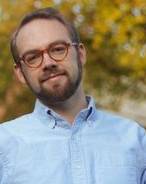 Dr. W. Clark Wolf receives award from American Philosophical Association
Dr. W. Clark Wolf receives award from American Philosophical Association
Dr. W. Clark Wolf, Teaching Assistant Professor of Philosophy, was awarded the 2022 Routledge, Taylor & Francis Prize by the American Philosophical Association. Read more here
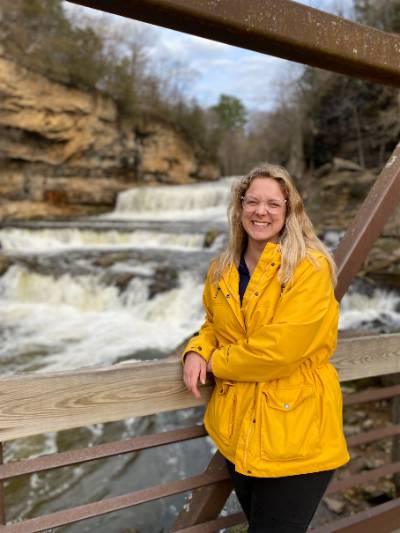
Sarah Hayden. I am a senior studying biomedical engineering and philosophy. This summer I interned with UN&UP in St. Louis, a biotech startup company motivated to serve unmet needs in underserved populations. Over the internship I assembled, qualified, and operated a CNC mill, designed and mapped a double magnet system to aid in our nanoparticle research development, and I met with multiple clinical experts to further understand intraventricular hemorrhage in neonates. Throughout the summer, I met weekly with my mentor to understand and develop a more rounded perspective on my own personal goals in the engineering field, which is where my interest in philosophy plays a huge role. Adding the double major of Philosophy allows me to not only meet new people with new perspectives outside of the engineering college, but the classes themselves challenge me in ways engineering hasn't. After I graduate this May, I will be returning to Marquette to obtain my masters in biomedical engineering through the accelerated degree program.
teaching pedagogy in higher education, about which he wrote a book in 2019.
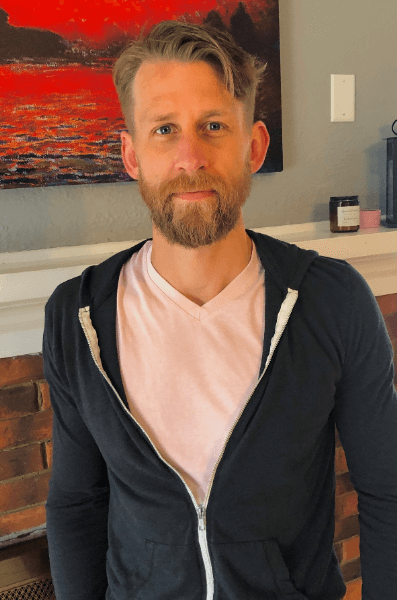 Dustin Trampe is a representative of the Philosophy Graduate Student Association (PGSA), in which role he is working to improve connections between faculty and graduate students and increase opportunities for grad students to present and refine their philosophical ideas. This year, he is involved in organizing the annual Marquette Graduate Student Conference and the Loyola-Marquette Phenomenology Conference. This semester he is presenting one paper at the Marquette Graduate Student Conference on the nature and ethics of care, and another paper at the Wisconsin Philosophical Association (WPA) Annual Meeting on moral deference. His thematic research interests include metaethics, normativity, and rationality, and their applications to contemporary social problems. He finds historical contributions to these contemporary interests especially in Kant, but also in philosophical sources from antiquity and the 20th century.
Dustin Trampe is a representative of the Philosophy Graduate Student Association (PGSA), in which role he is working to improve connections between faculty and graduate students and increase opportunities for grad students to present and refine their philosophical ideas. This year, he is involved in organizing the annual Marquette Graduate Student Conference and the Loyola-Marquette Phenomenology Conference. This semester he is presenting one paper at the Marquette Graduate Student Conference on the nature and ethics of care, and another paper at the Wisconsin Philosophical Association (WPA) Annual Meeting on moral deference. His thematic research interests include metaethics, normativity, and rationality, and their applications to contemporary social problems. He finds historical contributions to these contemporary interests especially in Kant, but also in philosophical sources from antiquity and the 20th century.
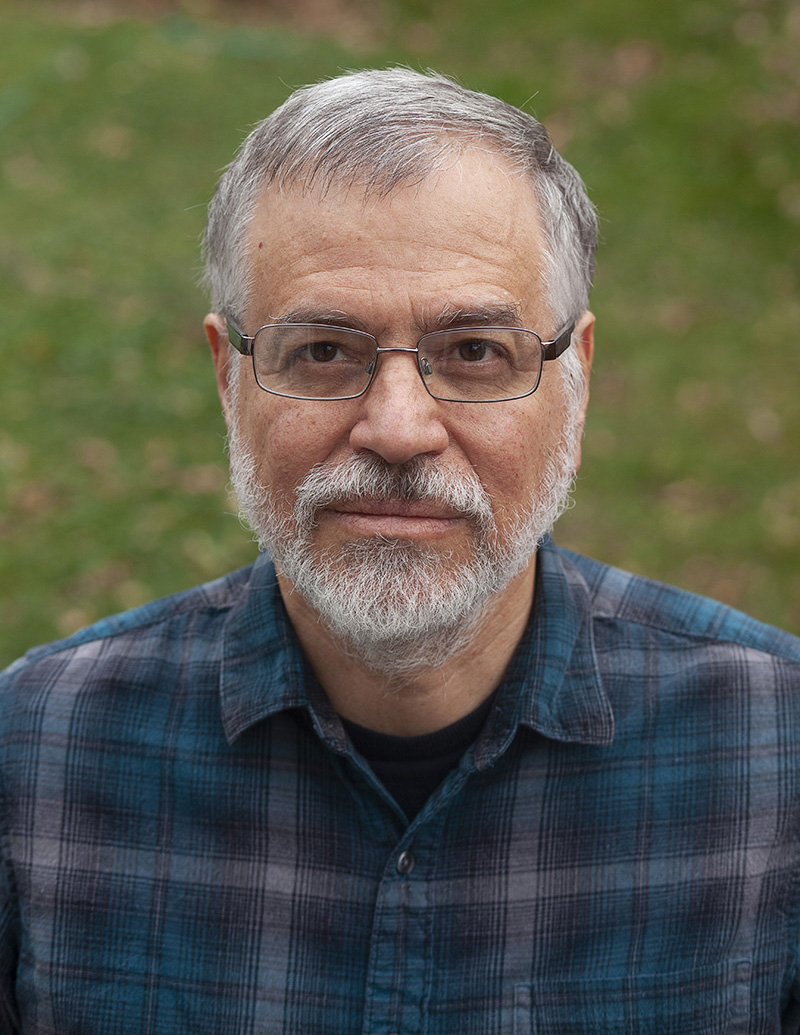 Dr. Owen Goldin has been a member of the Marquette University Philosophy Department since 1987. Much of his scholarship has focused on Aristotle’s account of what it means to have scientific or theoretical understanding, and how that account was interpreted and employed in late antiquity. He also written about the more general metaphysical questions that motivated Aristotle’s philosophy: how do language, science, logic and causality hang together? Over the years he has found that the Metaphysical Society of America is a good home for this kind of speculative thinking, and he is honored to be the current MSA President. Marquette will be hosting this year’s MSA conference March 24-27. The theme is “Metaphysical Traditions in Dialogue” and is devoted to showing how. For philosophers in both Western and non-Western traditions, understanding of the big issues is furthered by asking difficult questions of and respectfully listening to those who adopt very different worldviews.
Dr. Owen Goldin has been a member of the Marquette University Philosophy Department since 1987. Much of his scholarship has focused on Aristotle’s account of what it means to have scientific or theoretical understanding, and how that account was interpreted and employed in late antiquity. He also written about the more general metaphysical questions that motivated Aristotle’s philosophy: how do language, science, logic and causality hang together? Over the years he has found that the Metaphysical Society of America is a good home for this kind of speculative thinking, and he is honored to be the current MSA President. Marquette will be hosting this year’s MSA conference March 24-27. The theme is “Metaphysical Traditions in Dialogue” and is devoted to showing how. For philosophers in both Western and non-Western traditions, understanding of the big issues is furthered by asking difficult questions of and respectfully listening to those who adopt very different worldviews.
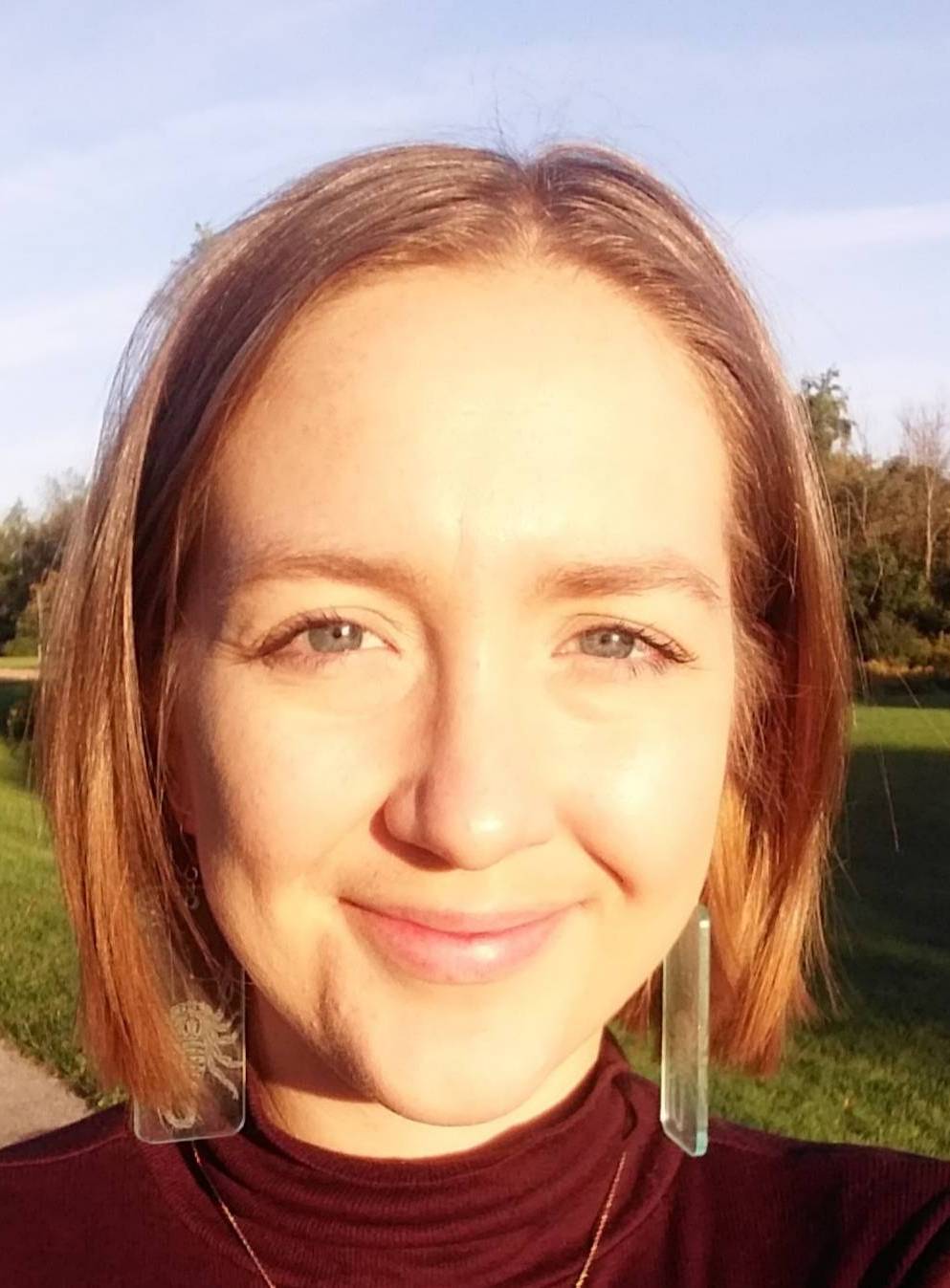 Melady Elifritz is the current director of the Philosophy Graduate Student Association (PGSA) and a member of Minorities And Philosophy (MAP). Her work in both organizations includes facilitating dialogue between students and faculty, addressing inequity in the field of philosophy, and (more recently) planning the spring graduate student conference on the philosophy of care. She works broadly in social and political philosophy, phenomenology, and applied ethics. Her current research focuses on pregnancy and birth, queer parenting, and the development of narrative self-identity of infancy and early childhood despite the lack of episodic memories.
Melady Elifritz is the current director of the Philosophy Graduate Student Association (PGSA) and a member of Minorities And Philosophy (MAP). Her work in both organizations includes facilitating dialogue between students and faculty, addressing inequity in the field of philosophy, and (more recently) planning the spring graduate student conference on the philosophy of care. She works broadly in social and political philosophy, phenomenology, and applied ethics. Her current research focuses on pregnancy and birth, queer parenting, and the development of narrative self-identity of infancy and early childhood despite the lack of episodic memories.
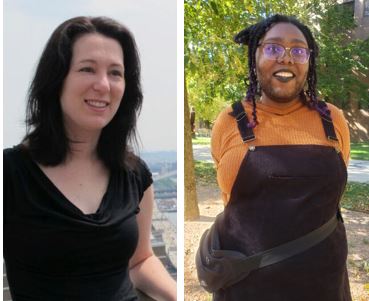
Corinne Bloch-Mullins: I’ll be collaborating on this project with Dr. Robert Goldstone, Distinguished Professor in the Department of Psychological and Brain Sciences at Indiana University. My main research interest is the study of concepts—the mental categories with which we carve up the world, and which enable us to integrate our experiences and generalize from them. My research program is highly interdisciplinary, drawing on my training in both philosophy and science. My current work falls into two interrelated projects: The first draws on literature in cognitive science to address questions about the formation and application of concepts. The second applies these ideas in the examination of scientific concepts, and the roles they play in investigative practice.
Karolyn Burns: With MAP, we have hosted community events, fruitful conversations with Philosophy Faculty, as well as partnered with the PGSA to host the graduate student conference in the spring. I have recently been selected to represent the Metaphysical Society of America as a Society Scholar for the ACLS 2022 Intention Foundry. I hope to get a project funded that will benefit minoritized folx in Philosophy and the community at large.
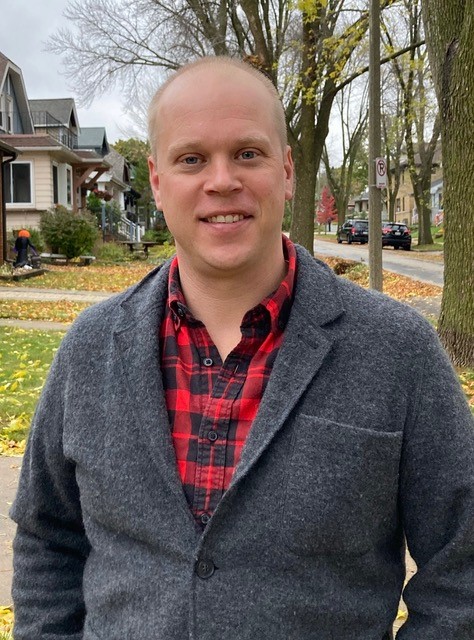 Michael Olson has taught in the Core Curriculum and the Honors Program since 2018. His research aims to understand how early modern authors’ efforts to integrate philosophical and natural scientific approaches to studying human life can both shed light on the modern legacies of Enlightenment conceptions of human nature and help us think more subtly about the value and challenges of interdisciplinary research today.
Michael Olson has taught in the Core Curriculum and the Honors Program since 2018. His research aims to understand how early modern authors’ efforts to integrate philosophical and natural scientific approaches to studying human life can both shed light on the modern legacies of Enlightenment conceptions of human nature and help us think more subtly about the value and challenges of interdisciplinary research today.
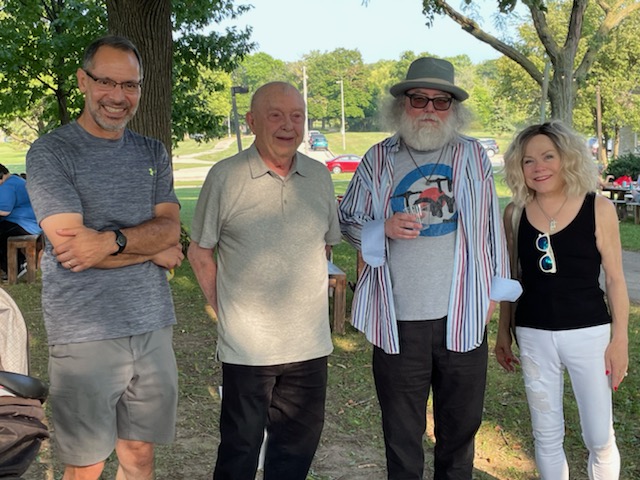 Dr. Curtis L. Carter
Dr. Curtis L. Carter
The Haggerty Museum of Art honored Founding Director Dr. Curtis L. Carter, Schuenke Chair of Philosophy, at a Dinner Celebration of the Museum’s 35th Anniversary on September 23, 2021.
Q: What are some of the highlights of the process from selection of the architect to the grand opening? How much were you involved in the daily building process? How did the Haggerty’s become involved?
Response: One of the important highlights during the building process was the visit of New York artist Keith Haring who was just at the beginning of his career. Haring is now one of the world famous artists and the Keith Haring work ( a construction fence wall 8 ft, by 96 ft.) is a major piece in the Haggerty Museum Collection.
Another highlight during the building process was the enthusiasm of the students who formed a Student Fine Arts Committee and were actively engaged throughout the building process. They primed the wall that Haring painted and were present during the event.
Q: What sparked your interest in inviting artist Keith Haring to paint the construction fence. Did you have a sense of what a significant step that would be for the museum? What was the response on campus and in town to his participation?
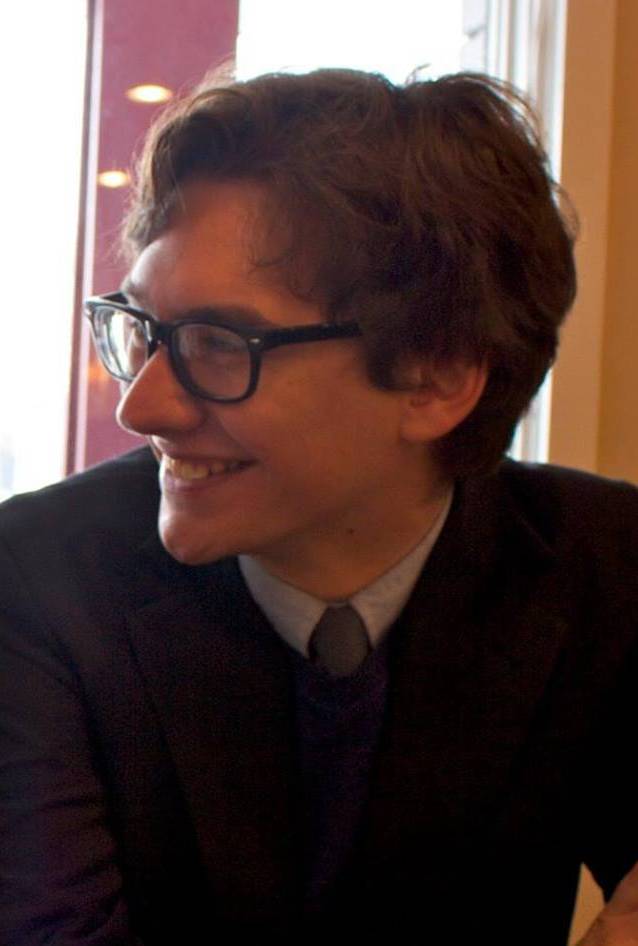
Graduate Student Nathaniel Taylor: My research is in medieval Latin and Arabic philosophy, especially Avicenna and Thomas Aquinas. I am particularly interested in where metaphysics, philosophy of language, logic, and the philosophy of science meet. My dissertation is on the definition of substance starting in Aristotle's metaphysics, its development in the late-antique Neoplatonic commentators, and up to the metaphysics of Avicenna and Aquinas. Much of my work centers around the project of recovering this admittedly mysterious science called "metaphysics" that the philosophers of the classical tradition practiced: what is its subject matter? What is substance? What is the method this science uses? How does it relate to logic? I have also been honored to introduce my students to the master of metaphysics, Plato, in my introduction course. I will be the Rev. John P. Raynor, S.J. Fellow at Marquette University in AY 2021-2022.
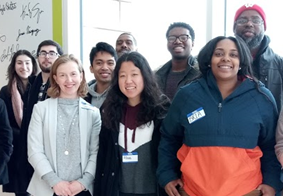 Theresa Tobin, Associate Professor: I’m interested in questions at the intersection of gender, sexuality, religious experience, and emotion. My current research with Dawne Moon, Professor of Sociology, explores spiritual violence many LGBTQ+ Christians experience when their faith communities relentlessly shame them, leading them to believe that God despises them or wants them to suffer. We examine the harms of spiritual abuse and how humility, pride, and radical love foster healing, resistance, and solidarity with broader social justice movements. My teaching emphasizes the role of the university and the humanities in decarceration. I will serve as the Director of the Education Preparedness Program, a collaborative initiative through Marquette’s Center for Urban Research, Teaching, and Outreach that offers educational opportunities and wrap-around academic support to people directly impacted by the carceral system.
Theresa Tobin, Associate Professor: I’m interested in questions at the intersection of gender, sexuality, religious experience, and emotion. My current research with Dawne Moon, Professor of Sociology, explores spiritual violence many LGBTQ+ Christians experience when their faith communities relentlessly shame them, leading them to believe that God despises them or wants them to suffer. We examine the harms of spiritual abuse and how humility, pride, and radical love foster healing, resistance, and solidarity with broader social justice movements. My teaching emphasizes the role of the university and the humanities in decarceration. I will serve as the Director of the Education Preparedness Program, a collaborative initiative through Marquette’s Center for Urban Research, Teaching, and Outreach that offers educational opportunities and wrap-around academic support to people directly impacted by the carceral system.

Marisola Xhelili Ciaccio is a native of Albania and is writing her doctoral dissertation on the colonial legacy of Balkan identity. Her broader interests lie in the criticism and disruption of social systems with an eye towards justice for underserved populations. She values taking a collaborative approach in her research, pedagogy, and activism. Marisola's newest publication, co-authored with Marquette Philosophy alumna Drew Dumaine, is forthcoming in a volume entitled Applying Nonideal Theory to Bioethics: Living and Dying in a Nonideal World. Marisola’s pedagogy and activism have centered around carceral justice and reimagining the university’s role in decarceration. She was recently appointed as Associate Director of the Education Preparedness Program--an initiative that provides education and wrap-around support to currently and formerly incarcerated students--which she co-founded with a team of faculty across the College of Arts and Sciences.
 Consolations of Spinoza
Consolations of Spinoza
Although it is coming out in the Winter of 2021, I wrote “The Consolations of Spinoza” in the summer of 2020. While I have published on the history of philosophy, I am interested in how philosophers of the past and present understand how individual humans can be coordinated into collective action, or politics. I am interested in how emotions and our conceptions of the world create our social world. In this piece, I reflect on my own response to what I take to be a troubling moment in American History.
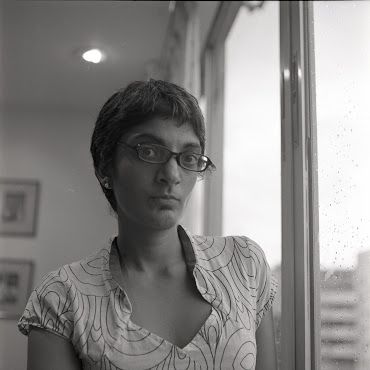
'We Are Each Others'
Shaila Wadhwani-Greenhalgh was selected to receive an Educator Curriculum Award as part of the 'We Are Each Others' Campaign through the Interfaith Youth Core. With this award Shaila will join a diverse group of educators dedicated to implementing programs at the intersection of racial equity and interfaith cooperation. The curriculum, which will be embedded in Shaila's Business Ethics course in the Spring, equips young people to engage in acts of interfaith cooperation, anti-racism, and service with their communities. Shaila's dissertation research centers on the historical ontology of nature, particularly as it relates to modernity and colonialism.
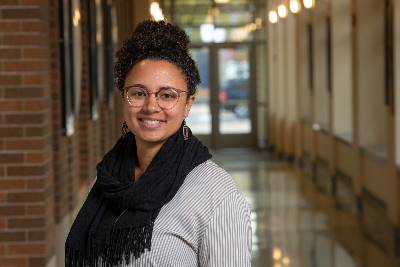
Dr. Desiree Valentine and the Concept of Access Intimacy
Dr. Desiree Valentine's research lies at the intersection of critical disability studies, philosophies of liberation, and ethics. In this paper, I offer a critical phenomenological view of the concept of access intimacy, a term coined by disability justice advocate, Mia Mingus. Access intimacy refers to a mode of relation between disabled people or between disabled and non-disabled people that can be born of concerted cultivation or instantly intimated and centrally concerns the feeling of someone genuinely understanding and anticipating another’s access needs. Putting in conversation this notion of intimacy with Kym Maclaren’s critical phenomenological account of intimacy, I show how accessibility is not about what one person or institution can do for another but involves an ongoing, interpersonal process of relating and taking responsibility for our inevitable encroachment on one another and in ways that enhance one another’s freedom.
Dr. Stephanie Rivera Berruz gives the keynote address at the 5th Latinx Philosophy Conference
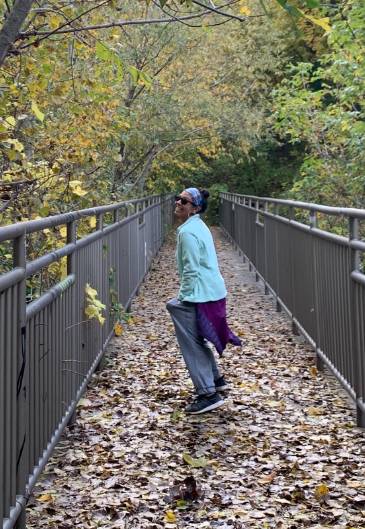 Dr. Stephanie Rivera Berruz’s research sits at the intersection between Caribbean and Latin American philosophy and philosophies of race, gender, and sexualities. The upcoming keynote explores the ways the Pulse Night Club massacre that took place on June 12, 2016 elucidates the intersection between sexuality of terrorism and the whiteness of homonationalism that exceeds our understanding of violence enacted on queer of color subjects, which in this context centers the queer Puerto Rican diasporic subject.
Dr. Stephanie Rivera Berruz’s research sits at the intersection between Caribbean and Latin American philosophy and philosophies of race, gender, and sexualities. The upcoming keynote explores the ways the Pulse Night Club massacre that took place on June 12, 2016 elucidates the intersection between sexuality of terrorism and the whiteness of homonationalism that exceeds our understanding of violence enacted on queer of color subjects, which in this context centers the queer Puerto Rican diasporic subject.
The 5th Latinx Philosophy Conference will take place virtually on October 30-31. The event is being organized by Marquette Philosophy’s Javiera Perez Gomez with keynote address scheduled for 1-2:15 pm CST.
Sterling Knox Research on Addiction and Agency
 Sterling Knox is a first year in the Philosophy Ph.D. program and is a an intern with the Great Lakes Inter-Tribal Council (GLITC) called Native American Research Center for Health (NARCH). The goal of NARCH is to “Provide a cooperative structure for the development and implementation of high quality, culturally sensitive and community supported research linked to health disparity issues. Collaborative effort will facilitate the participation of American Indians and Alaskan Natives in the research process through training and mentoring opportunities within both academic and community settings.” Knox’s research mentor is Dr. Margaret Noodin and is centered around addiction and agency. The aim is to develop a framework for thinking about agency and responsibility in an Anishinaabe context. Knox’s hope is to provide an expansive notion of agency as socially constituted to serve as a basis for possible alternative approaches to healing and treatment.
Sterling Knox is a first year in the Philosophy Ph.D. program and is a an intern with the Great Lakes Inter-Tribal Council (GLITC) called Native American Research Center for Health (NARCH). The goal of NARCH is to “Provide a cooperative structure for the development and implementation of high quality, culturally sensitive and community supported research linked to health disparity issues. Collaborative effort will facilitate the participation of American Indians and Alaskan Natives in the research process through training and mentoring opportunities within both academic and community settings.” Knox’s research mentor is Dr. Margaret Noodin and is centered around addiction and agency. The aim is to develop a framework for thinking about agency and responsibility in an Anishinaabe context. Knox’s hope is to provide an expansive notion of agency as socially constituted to serve as a basis for possible alternative approaches to healing and treatment.
Melissa Shew and Philosophy for Girls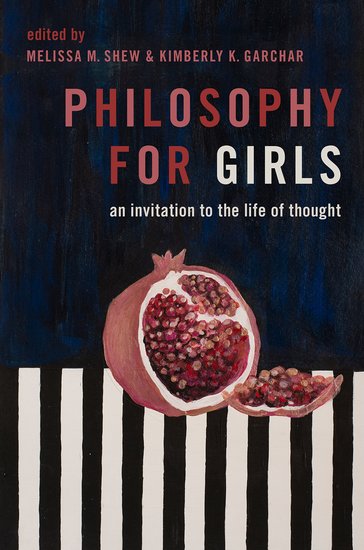
Melissa M. Shew is Visiting Professor of Philosophy at Marquette University. Her expertise and interests are wide-ranging from ancient Greek to contemporary philosophy, philosophy of literature and the arts, and pedagogy. Shew edited Philosophy for Girls with Kim Garchar, Kent State University, forthcoming from Oxford University Press in Fall 2020. The book's twenty chapters are written by a diverse cross-section of expert women in philosophy and draws nearly exclusively on women philosophers. This volume is a rigorous yet accessible entry-point to philosophical contemplation and is designed for individual readers of all gender identities, use in university and high school classrooms, and for those who seek to inspire new generations of philosophers by offering a lively counterpoint to standard books and anthologies in philosophy.
 Dr. W. Clark Wolf receives award from American Philosophical Association
Dr. W. Clark Wolf receives award from American Philosophical Association
 Dustin Trampe is a representative of the Philosophy Graduate Student Association (PGSA), in which role he is working to improve connections between faculty and graduate students and increase opportunities for grad students to present and refine their philosophical ideas. This year, he is involved in organizing the annual Marquette Graduate Student Conference and the Loyola-Marquette Phenomenology Conference. This semester he is presenting one paper at the Marquette Graduate Student Conference on the nature and ethics of care, and another paper at the Wisconsin Philosophical Association (WPA) Annual Meeting on moral deference. His thematic research interests include metaethics, normativity, and rationality, and their applications to contemporary social problems. He finds historical contributions to these contemporary interests especially in Kant, but also in philosophical sources from antiquity and the 20th century.
Dustin Trampe is a representative of the Philosophy Graduate Student Association (PGSA), in which role he is working to improve connections between faculty and graduate students and increase opportunities for grad students to present and refine their philosophical ideas. This year, he is involved in organizing the annual Marquette Graduate Student Conference and the Loyola-Marquette Phenomenology Conference. This semester he is presenting one paper at the Marquette Graduate Student Conference on the nature and ethics of care, and another paper at the Wisconsin Philosophical Association (WPA) Annual Meeting on moral deference. His thematic research interests include metaethics, normativity, and rationality, and their applications to contemporary social problems. He finds historical contributions to these contemporary interests especially in Kant, but also in philosophical sources from antiquity and the 20th century. Dr. Owen Goldin
Dr. Owen Goldin Melady Elifritz is the current director of the Philosophy Graduate Student Association (PGSA) and a member of Minorities And Philosophy (MAP). Her work in both organizations includes facilitating dialogue between students and faculty, addressing inequity in the field of philosophy, and (more recently) planning the spring graduate student conference on the philosophy of care.
Melady Elifritz is the current director of the Philosophy Graduate Student Association (PGSA) and a member of Minorities And Philosophy (MAP). Her work in both organizations includes facilitating dialogue between students and faculty, addressing inequity in the field of philosophy, and (more recently) planning the spring graduate student conference on the philosophy of care.
 Michael Olson has taught in the Core Curriculum and the Honors Program since 2018. His research aims to understand how early modern authors’ efforts to integrate philosophical and natural scientific approaches to studying human life can both shed light on the modern legacies of Enlightenment conceptions of human nature and help us think more subtly about the value and challenges of interdisciplinary research today.
Michael Olson has taught in the Core Curriculum and the Honors Program since 2018. His research aims to understand how early modern authors’ efforts to integrate philosophical and natural scientific approaches to studying human life can both shed light on the modern legacies of Enlightenment conceptions of human nature and help us think more subtly about the value and challenges of interdisciplinary research today.

 Theresa Tobin, Associate Professor: I’m interested in questions at the intersection of gender, sexuality, religious experience, and emotion. My current research with Dawne Moon, Professor of Sociology, explores spiritual violence many LGBTQ+ Christians experience when their faith communities relentlessly shame them, leading them to believe that God despises them or wants them to suffer. We examine the harms of spiritual abuse and how humility, pride, and radical love foster healing, resistance, and solidarity with broader social justice movements. My teaching emphasizes the role of the university and the humanities in decarceration. I will serve as the Director of the Education Preparedness Program, a collaborative initiative through Marquette’s Center for Urban Research, Teaching, and Outreach that offers educational opportunities and wrap-around academic support to people directly impacted by the carceral system.
Theresa Tobin, Associate Professor: I’m interested in questions at the intersection of gender, sexuality, religious experience, and emotion. My current research with Dawne Moon, Professor of Sociology, explores spiritual violence many LGBTQ+ Christians experience when their faith communities relentlessly shame them, leading them to believe that God despises them or wants them to suffer. We examine the harms of spiritual abuse and how humility, pride, and radical love foster healing, resistance, and solidarity with broader social justice movements. My teaching emphasizes the role of the university and the humanities in decarceration. I will serve as the Director of the Education Preparedness Program, a collaborative initiative through Marquette’s Center for Urban Research, Teaching, and Outreach that offers educational opportunities and wrap-around academic support to people directly impacted by the carceral system. 
 Consolations of Spinoza
Consolations of Spinoza

 Dr. Stephanie Rivera Berruz’s research sits at the intersection between Caribbean and Latin American philosophy and philosophies of race, gender, and sexualities. The upcoming keynote explores the ways the Pulse Night Club massacre that took place on June 12, 2016 elucidates the intersection between sexuality of terrorism and the whiteness of homonationalism that exceeds our understanding of violence enacted on queer of color subjects, which in this context centers the queer Puerto Rican diasporic subject.
Dr. Stephanie Rivera Berruz’s research sits at the intersection between Caribbean and Latin American philosophy and philosophies of race, gender, and sexualities. The upcoming keynote explores the ways the Pulse Night Club massacre that took place on June 12, 2016 elucidates the intersection between sexuality of terrorism and the whiteness of homonationalism that exceeds our understanding of violence enacted on queer of color subjects, which in this context centers the queer Puerto Rican diasporic subject. Sterling Knox is a first year in the Philosophy Ph.D. program and is a an intern with the Great Lakes Inter-Tribal Council (
Sterling Knox is a first year in the Philosophy Ph.D. program and is a an intern with the Great Lakes Inter-Tribal Council (



